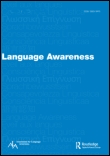
Language Awareness
Scope & Guideline
Championing Scholarly Discourse in Linguistics
Introduction
Aims and Scopes
- Language Awareness and Critical Pedagogy:
The journal promotes critical language awareness, encouraging educators and learners to reflect on the socio-political implications of language use and teaching practices. - Multilingualism and Plurilingual Education:
Research in this area explores the complexities of teaching and learning in multilingual contexts, emphasizing the benefits and challenges of plurilingual education. - Metalinguistic Awareness:
A significant focus is placed on developing metalinguistic knowledge among learners and teachers, examining how awareness of language structure and function can enhance language learning. - Task-Based Language Learning:
The journal includes studies on task-based approaches to language education, investigating how different tasks can foster language acquisition and awareness. - Teacher Education and Professional Development:
Research addresses the preparation and ongoing development of language teachers, highlighting the importance of language awareness in teacher education programs. - Language and Identity:
The intersection of language use and identity formation is explored, particularly how language awareness can influence learners' perceptions of their own and others' identities.
Trending and Emerging
- Translanguaging Practices:
Emerging research on translanguaging reflects the dynamic use of multiple languages in educational settings, emphasizing the fluidity of language identities and practices among learners. - Digital Literacy and Language Awareness:
As digital communication becomes increasingly prevalent, studies examining the intersection of digital literacy and language awareness are gaining traction, highlighting the need for learners to navigate language use in online environments. - Intercultural Competence:
There is a growing emphasis on intercultural communicative competence, examining how language awareness can enhance learners' abilities to engage effectively in diverse cultural contexts. - Critical Multilingual Awareness:
Research focusing on critical multilingual awareness is on the rise, advocating for social justice and equity in language education by addressing power dynamics and language rights. - Collaborative Learning Approaches:
The trend toward collaborative and peer-based learning models is evident, with research exploring how these approaches can enhance language awareness and engagement among learners.
Declining or Waning
- Traditional Language Teaching Methods:
There appears to be a waning interest in conventional language teaching methodologies that do not incorporate critical or reflective practices, as the focus shifts toward more innovative and awareness-based approaches. - Native Speaker Norms:
Research centered around native speaker models and attitudes is less prevalent, indicating a move away from traditional views of language proficiency toward a more inclusive understanding of multilingual competencies. - Focus on Grammatical Competence Alone:
There is a noticeable decline in studies solely emphasizing grammatical competence without considering the broader context of language use and learner agency. - Standardized Language Testing:
Interest in standardized testing practices, particularly those that do not account for linguistic diversity, is diminishing as the field shifts toward more formative and context-sensitive assessment approaches.
Similar Journals
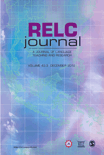
RELC Journal
Challenging Perspectives, Inspiring Change in Language EducationRELC Journal, published by SAGE Publications Ltd, stands as a leading platform in the fields of Education and Linguistics, boasting an impressive Q1 ranking in both categories according to the latest metrics. Established in 1970 and continuing its commitment to academic excellence through 2024, the journal features rigorous peer-reviewed research that explores the intersections of language, culture, and pedagogy. With a notable Scopus ranking that places it in the 98th percentile for both Language and Linguistics (Rank #16/1088) and Education (Rank #91/1543), the RELC Journal is essential for scholars, educators, and practitioners seeking to contribute to and stay abreast of cutting-edge developments in their respective fields. Although currently not open access, the journal remains accessible to a diverse audience and invites contributions that challenge conventional perspectives and inspire innovative practices in language education.
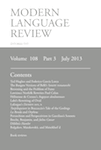
MODERN LANGUAGE REVIEW
Unveiling Contemporary Debates in Humanities ResearchMODERN LANGUAGE REVIEW, published by the Modern Humanities Research Association, is a pivotal academic journal based in the United Kingdom, focusing on the fields of linguistics, literature, and literary theory. With an ISSN of 0026-7937 and an E-ISSN of 2222-4319, this journal serves as a platform for disseminating research that explores the nuances of language and its literary contexts. Although currently not an open-access publication, it provides valuable insight into a range of topics, contributing to a deeper understanding of human communication and expression. Covering a wide scope with a publication history from 2002 to 2024, the journal is indexed in Scopus and holds a Q4 ranking in both linguistics and literature categories, indicating its emerging influence within these academic disciplines. As the landscape of humanities research continues to evolve, MODERN LANGUAGE REVIEW remains a vital resource for scholars, professionals, and students aiming to engage with contemporary debates and developments in language and literature.
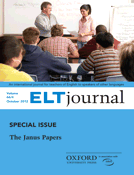
ELT Journal
Connecting Research with Real-World ELT ApplicationsELT Journal, published by Oxford University Press, is a premier academic journal dedicated to the fields of Educational Psychology, Linguistics, and Language, boasting an esteemed Q1 category ranking across these disciplines. Since its inception in 1946, the journal has served as a vital platform for researchers and educators, offering insights into English Language Teaching (ELT) and the evolving pedagogical practices that influence language acquisition and literacy development. With an impressive Scopus ranking placing it in the 95th percentile within the Arts and Humanities (Linguistics and Language), ELT Journal not only contributes to academic discourse but also bridges theoretical frameworks with practical applications in educational settings. Although it does not currently offer Open Access, the journal remains essential for professionals and students alike, eager to stay abreast of the latest research trends and innovations in the global ELT landscape. For those committed to advancing their understanding of language education, the journal's diverse range of articles and case studies provide invaluable resources.
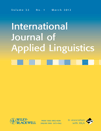
International Journal of Applied Linguistics
Exploring Real-World Applications of LinguisticsInternational Journal of Applied Linguistics, published by WILEY, is a premier platform for cutting-edge research in the field of applied linguistics. With a notable Impact Factor and ranked in the top Q1 quartile of linguistics and language, this journal serves as an essential resource for scholars, practitioners, and students. The journal’s wide-ranging scope includes various subfields such as language acquisition, language education, sociolinguistics, and discourse analysis, fostering multidisciplinary approaches to language studies. It has achieved a significant Scopus Rank, placing it in the 90th percentile for both Arts and Humanities as well as Social Sciences categories, reflecting its high visibility and influence in the academic community. The International Journal of Applied Linguistics is committed to advancing the understanding of language use in real-world contexts through rigorously peer-reviewed articles that contribute to both theory and practical applications. While it is not an open-access journal, it remains a highly respected publication for researchers looking to disseminate and acquire knowledge in applied linguistics.

Chuzhdoezikovo Obuchenie-Foreign Language Teaching
Connecting Scholars in Foreign Language EducationIntroducing Chuzhdoezikovo Obuchenie - Foreign Language Teaching, a prominent journal published by NATSIONALNO IZDATELSTVO AZ BUKI, dedicated to the field of foreign language education. With its ISSN 0205-1834 and E-ISSN 1314-8508, this journal aims to provide a comprehensive platform for researchers, educators, and practitioners to share insightful studies, innovative methodologies, and transformative practices in language teaching. The journal is based in Sofia, Bulgaria and is strategically positioned to contribute to the discourse on language acquisition and pedagogy, targeting a global audience interested in enhancing foreign language competencies. Although specific impact factors and H-index data may be unavailable, the journal's commitment to quality and relevance in the field is evident through its rigorous peer-review process, ensuring that published works meet high academic standards. Emphasizing accessibility and inclusivity, Chuzhdoezikovo Obuchenie invites submissions that reflect contemporary challenges and advancements in language education, making it an essential resource for anyone invested in the future of multilingual instruction.
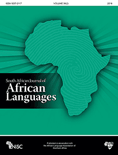
South African Journal of African Languages
Exploring the richness of linguistic diversity across Africa.The South African Journal of African Languages, published by Routledge Journals, Taylor & Francis Ltd, is a premier academic resource dedicated to the advancement of research in the fields of linguistics, language, and literary theory. Since its inception in 1996, this journal has been pivotal in fostering scholarly discourse around African languages, contributing significantly to our understanding of cultural and linguistic diversity across the continent. With its impressive categorization in 2023 as Q2 in Linguistics and Language and Q1 in Literature and Literary Theory, the journal attracts high-quality research and innovative perspectives, positioning itself among the leading publications in the relevant academic arenas. Researchers and students alike will find valuable insights within its pages, as it consistently ranks in the top percentiles of Scopus, notably achieving an 81st percentile in Literature and Literary Theory. The journal is committed to enhancing accessibility to research, although it currently does not offer Open Access options. Its scope includes an array of topics related to language policy, linguistic preservation, and literary critique, making it an essential resource for those engaged in the rich tapestry of African linguistics and literature.

Yazyk i Kultura-Language and Culture
Advancing Insights into Language and Cultural DynamicsYazyk i Kultura - Language and Culture is a distinguished academic journal dedicated to the exploration of linguistic and cultural issues across various contexts. Published by TOMSK STATE UNIVERSITY, this journal serves as a vital resource for researchers, scholars, and students interested in the intricate interplay between language and culture. With an ISSN of 1999-6195 and an E-ISSN of 2311-3235, it engages a global community in disseminating high-quality research articles, reviews, and theoretical discussions. Although the journal is not categorized as Open Access, it ensures that its contents contribute significantly to the academic discourse within the fields of linguistics, cultural studies, and social sciences. With a commitment to promoting scholarly research, Yazyk i Kultura is positioned to shape contemporary conversations about language's role in cultural dynamics, making it an essential outlet for those dedicated to advancing understanding in this interdisciplinary domain.
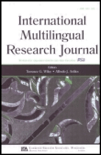
International Multilingual Research Journal
Unpacking the complexities of multilingualism in today's world.The International Multilingual Research Journal, published by Routledge Journals, Taylor & Francis Ltd, is a leading platform for the dissemination of innovative research in the fields of Education and Linguistics. With an impact factor reflecting its rigorous academic standards and a Q1 ranking in both relevant categories, this journal is dedicated to advancing the understanding of multilingualism and its implications globally. It serves as an essential resource for researchers, educators, and practitioners who seek to explore the complexities of language and learning across diverse cultural contexts. Since its inception in 2010, the journal has converged a wealth of scholarly articles that address contemporary issues in language use and pedagogical practices. The journal adheres to the highest research integrity standards and promotes open dialogue among scholars, making it a vital tool for those engaged in this expanding field. With its strong positioning in prestigious databases like Scopus, the International Multilingual Research Journal is committed to enriching the academic community and fostering interdisciplinary collaborations.

Language Learning in Higher Education
Cultivating excellence in language acquisition methodologies.Language Learning in Higher Education is a prominent academic journal published by DE GRUYTER MOUTON, dedicated to exploring the intricate dynamics of language acquisition and pedagogical practices within the higher education context. With a robust ISSN: 2191-611X and E-ISSN: 2191-6128, this journal provides a platform for innovative research that addresses contemporary challenges and methodologies in language education. The journal enjoys a favorable reputation in the academic community, as evidenced by its ranks in the Scopus database, where it holds a position in the 67th percentile for Language and Linguistics and is classified in the Q3 and Q2 quartiles across relevant education and linguistics categories. Since its convergence in 2017, Language Learning in Higher Education aims to enrich scholarly discourse by publishing high-quality articles that foster insights into effective language learning strategies, thus serving as an essential resource for researchers, educators, and students committed to enhancing language education. The journal's editorial team is devoted to advancing the field through rigorous peer-review processes and welcomes contributions that push the boundaries of language learning research.
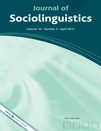
JOURNAL OF SOCIOLINGUISTICS
Charting New Territories in Language Variation and ChangeThe Journal of Sociolinguistics, published by Wiley in the United Kingdom, is a leading interdisciplinary journal that explores the intricate relationships between language and society. With an impressive impact factor reflecting its Q1 quartile ranking in Histories and Philosophy of Science, Linguistics, Philosophy, and Sociology, this journal is recognized for its scholarly contributions, making it a vital resource for academics and practitioners in these dynamic fields. Covering a wide scope of topics from language variation and change to sociocultural dynamics, the journal has converged from 2004 to 2024, ensuring a comprehensive understanding of contemporary sociolinguistic issues. Although operating under a traditional access model, the Journal of Sociolinguistics remains pivotal for advancing critical dialogue and research for professionals, researchers, and students invested in linguistic and sociological studies.